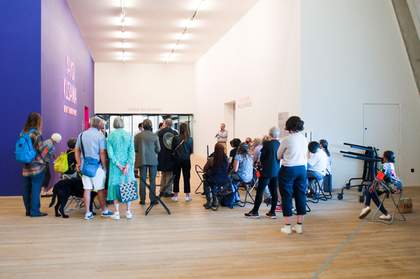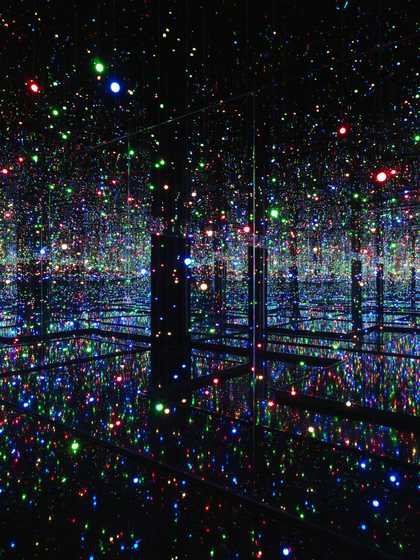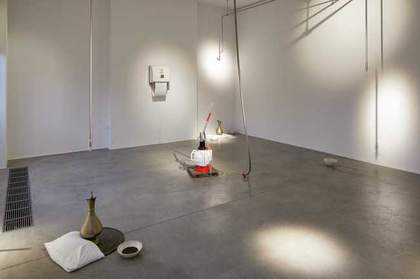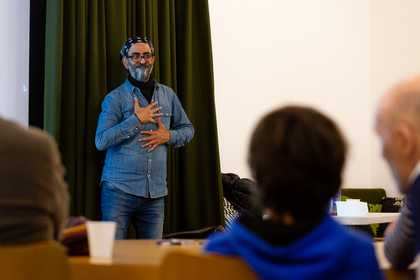This event will bring together institutional representatives from across the globe to discuss what art institutions are currently offering neurodivergent or disabled audiences, what these audiences want from museums and institutions, and how can institutions be more accommodating for these audiences. The panel discussion will be chaired by artist and consultant Jack Ky Tan.
The panellists include Kate Adams, Marcus Dickey-Horley and Rebecca McGinnis.
What do we mean by ‘neurodiversity’?
We are currently working with the definition that ‘neurodiversity’ refers to the diversity of human minds and the infinite variation in neurocognitive functioning within our species. Neurodiversity is the idea that neurological differences, including diagnosis of autism, dyslexia, dyspraxia, or ADHD to name a few, are a normal part of human diversity rather than disorders.
What do we mean by ‘neurodivergent’?
We are current working with the definition that ‘neurodivergent’ means having a mind which differs from dominate societal understandings of “normative” neurocognitive functioning. This identifier covers a broad range of neurodivergent conditions, such as the ones mentioned above.
While the term neurodivergent is used here to refer to a range of conditions that affect a person’s neurocognitive functioning, we acknowledge that people may prefer to use other terms like learning difference, learning difficulty, or learning disability. The conversation around these terms is still very much live and therefore how we use these terms is a starting point to learn, build a greater understanding, and instigate change.
Throughout the run of the Yayoi Kusama: Infinity Mirror Rooms exhibition, Tate’s Public Programmes team ran a durational series of out of hours events that provided a relaxed viewing for disabled or neurodivergent, and any other visitors with sensory needs who preferred a more relaxed experience. Alongside the relaxed viewing, there was a series of artists who delivered workshops geared towards disabled or neurodivergent audiences.
Neurodiversity and Museums Today is part of a series of events produced in partnership with The Metropolitan Museum of Art, New York. These events are part of the Terra Foundation for American Art Series: New Perspectives.
The event will be online and supported with live captioning and BSL interpretation.
Jack Ky Tan
Jack Ky Tan (b.1971, Singapore) is an interdisciplinary artist based in the UK. Working across, performance, sculpture, law and policy-making, his practice is an ongoing exploration of social justice that blurs the boundaries between, art, law, governance, and consultancy. Looking toward alternative cosmologies and knowledge systems that predate Judaeo-Christian or colonial narratives, Tan interrogates the legacies of colonialism with a particular interest in Commonwealth and Tropical epistemologies of resistance. By questioning how embedded societal structures form our laws and guide our behaviour, Tan's work attempts to rethink our entanglement with the human and more-than-human world, and looks towards alternative ways of living and working.
Tan originally studied and trained in law [LL.B (Hull), MA Social Justice(UCL)] and worked in British civil rights NGOs before obtaining a BA(Hons) in Ceramics at Harrow/Westminster University and an MA at the Royal College of Art. Jack then completed a practice-led PhD at Roehampton University where he explored legal aesthetics and performance art through his works Karaoke Court and Voices From The Courts. He has taught MA Sculpture at the Royal College of Art and MA Politics & Art at Goldsmiths.
Marcus Dickey-Horley
Marcus Dickey-Horley works across both London Tate sites and has responsibility for programming access events, delivering access guidance to a range of Tate departments, and providing access training and support to our Visitor Experience teams. The creation and delivery of a durational quiet hours programme for disabled and neurodivergent visitors to the Yayoi Kusama Infinity Mirror Rooms exhibition has led to a continuing review of how we can improve and develop our support for these and other valued audience sectors.
Rebecca McGinnis
Rebecca McGinnis is the Senior Managing Educator for Accessibility at The Metropolitan Museum of Art. She and her colleagues are internationally recognised for their pioneering programs for disabled people. Current work includes Crip The Met, an initiative fostering the inclusion of disability narratives in museum interpretation that aims to redress deficits and implicit biases in the representation of objects in the collection. Rebecca’s publications include “Who Does Inclusion Exclude?: Disability and the Limitations of Models of Inclusion” in What We May Be: Art Museums and the Implications of Special Programs (The Clark Art Institute, 2019) and “Islands of Stimulation: Perspectives on the Museum Experience, Present and Future” in The Multisensory Museum: Cross-Disciplinary Perspectives on Touch, Sound, Smell, Memory, and Space (Rowman & Littlefield, 2014).
Kate Adams
Kate Adams is an artist, advocate and activist. She is Artistic Director & CEO of Project Art Works and has initiated and curated many responsive, collaborative projects with people who have complex support needs, families, caregivers, artists and galleries.
Kate co-founded Project Art Works in 1997 to explore an expanded concept of art that was and continues to be influenced by Paul Colley, her son, who amongst many amazing attributes has complex support needs. Project Art Works collaborates with individuals and their circles of support. The work embraces personalised studio practice, peer support and award-winning films, art actions, installations and exhibitions. Kate’s practice aims to disrupt preconceptions about what people can and can’t do, who they are and how they live, and to reveal other ways of being in the world whilst subtly the exposing the constraints of neuronormative constructs and environments. Project Art Works were joint winners of the Film London Jarman Award 2020; shortlisted for the Turner Prize 2021 and commissioned by DOCUMENTA 15 as one of 15 global ‘lumbung’ collectives to present in Kassel, Germany in 2022.





